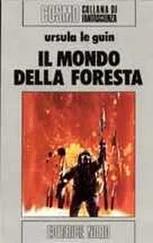The night darkened as Selver went, until even his night-seeing eyes saw nothing but masses and planes of black. It began to rain. He had gone only a few miles from Cadast when he must either light a torch, or halt. He chose to halt, and groping found a place among the roots of a great chestnut tree. There he sat, his back against the broad, twisting bole that seemed to hold a little sun-warmth in it still. The fine rain, falling unseen in darkness, pattered on the leaves overhead, on his arms and neck and head protected by their thick silk-fine hair, on the earth and ferns and undergrowth nearby, on all the leaves of the forest, near and far. Selver sat as quiet as the gray owl on a branch above him, unsleeping, his eyes wide open in the rainy dark.
Captain Raj Lyubov had a headache. It began softly in the muscles of his right shoulder, and mounted crescendo to a smashing drumbeat over his right ear. The speech centers are in the left cerebral cortex, he thought, but he couldn’t have said it; couldn’t speak, or read, or sleep, or think. Cortex, vortex. Migraine headache, margarine breadache, ow, ow, ow. Of course he had been cured of migraine once at college and again during his obligatory Army Prophylactic Psychotherapy Sessions, but he had brought along some ergotamine pills when he left Earth, just in case. He had taken two, and a superhyperduper-analgesic, and a tranquilizer, and a digestive pill to counteract the caffeine which counteracted the ergotamine, but the awl still bored out from within, just over his right ear, to the beat of the big bass drum. Awl, drill, ill, pill, oh God. Lord deliver us. Liver sausage. What would the Athsheans do for a migraine? They wouldn’t have one, they would have daydreamed the tensions away a week before they got them. Try it, try daydreaming. Begin as Selver taught you. Although knowing nothing of electricity he could not really grasp the principle of the EEG, as soon as he heard about alpha waves and when they appear he had said, “Oh yes, you mean this,” and there appeared the unmistakable alpha-squiggles on the graph recording what went on inside his small green head; and he had taught Lyubov how to turn on and off the alpha-rhythms in one half-hour lesson. There really was nothing to it. But not now, the world is too much with us, ow, ow, ow above the right ear I always hear Time’s winged chariot hurrying near, for the Athsheans had burned Smith Camp day before yesterday and killed two hundred men. Two hundred and seven to be precise. Every man alive except the Captain. No wonder pills couldn’t get at the center of his migraine, for it was on an island two hundred miles away two days ago. Over the hills and far away. Ashes, ashes, all fall down. And among the ashes, all his knowledge of the High Intelligence Life Forms of World 41. Dust, rubbish, a mess of false data and fake hypotheses. Nearly five E-years here, and he had believed the Athsheans to be incapable of killing men, his kind or their kind. He had written long papers to explain how and why they couldn’t kill men. All wrong. Dead wrong.
What had he failed to see?
It was nearly time to be going over to the meeting at HQ. Cautiously Lyubov stood up, moving all in one piece so that the right side of his head would not fall off; he approached his desk with the gait of a man underwater, poured out a shot of General Issue vodka, and drank it. It turned him inside out: it extraverted him: it normalized him. He felt better. He went out, and unable to stand the jouncing of his motorbike, started to walk down the long, dusty main street of Centralville to HQ. Passing the Luau, he thought with greed of another vodka; but Captain Davidson was just going in the door, and Lyubov went on.
The people from the Shackleton were already in the conference room. Commander Yung, whom he had met before, had brought some new faces down from orbit this time. They were not in Navy uniform; after a moment Lyubov recognized them, with a slight shock, as non-Terran humans. He sought an introduction at once. One, Mr. Or, was a Hairy Cetian, dark gray, stocky, and dour; the other, Mr. Lepennon, was tall, white, and comely: a Hainishman. They greeted Lyubov with interest, and Lepennon said, “I’ve just been reading your report on the conscious control of paradoxical sleep among the Athsheans, Dr. Lyubov,” which was pleasant, and it was pleasant also to be called by his own, earned title of doctor. Their conversation indicated that they had spent some years on Earth, and that they might be hilfers, or something like it; but the Commander, introducing them, had not mentioned their status or position.
The room was filling up. Gosse, the colony ecologist, came in; so did all the high brass; so did Captain Susun, head of Planet Development—logging operations—whose captaincy like Lyubov’s was an invention necessary to the peace of the military mind. Captain Davidson came in alone, straight-backed and handsome, his lean, rugged face calm and rather stern. Guards stood at all the doors. The Army necks were all stiff as crowbars. The conference was plainly an Investigation. Whose fault? My fault, Lyubov thought despairingly; but out of his despair he looked across the table at Captain Don Davidson with detestation and contempt.
Commander Yung had a very quiet voice. “As you know, gentlemen, my ship stopped here at World 41 to drop you off a new load of colonists, and nothing more; Shackleton’ s mission is to World 88, Prestno, one of the Hainish Group. However, this attack on your outpost camp, since it chanced to occur during our week here, can’t be simply ignored; particularly in the light of certain developments which you would have been informed of a little later, in the normal course of events. The fact is that the status of World 41 as an Earth Colony is now subject to revision, and the massacre at your camp may precipitate the Administration’s decisions on it. Certainly the decisions we can make must be made quickly, for I can’t keep my ship here long. Now first, we wish to make sure that the relevant facts are all in the possession of those present. Captain Davidson’s report on the events at Smith Camp was taped and heard by all of us on ship; by all of you here also? Good. Now if there are questions any of you wish to ask Captain Davidson, go ahead. I have one myself. You returned to the site of the camp the following day, Captain Davidson, in a large hopper with eight soldiers; had you the permission of a senior officer here at Central for that flight?”
Davidson stood up. “I did, sir.”
“Were you authorized to land and to set fires in the forest near the campsite?”
“No, sir.”
“You did, however, set fires?”
“I did, sir. I was trying to smoke out the creechies that killed my men.”
“Very well. Mr. Lepennon?”
The tall Hainishman cleared his throat. “Captain Davidson,” he said, “do you think that the people under your command at Smith Camp were mostly content?”
“Yes, I do.”
Davidson’s manner was firm and forthright; he seemed indifferent to the fact that he was in trouble. Of course these Navy officers and foreigners had no authority over him; it was to his own Colonel that he must answer for losing two hundred men and making unauthorized reprisals. But his Colonel was right there, listening.
“They were well fed, well housed, not overworked, then, as well as can be managed in a frontier camp?”
“Yes.”
“Was the discipline maintained very harsh?”
“No, it was not.”
“What, then, do you think motivated the revolt?”
“I don’t understand.”
“If none of them were discontented, why did some of them massacre the rest and destroy the camp?”
There was a worried silence.
“May I put in a word,” Lyubov said. “It was the native hilfs, the Athsheans employed in the camp, who joined with an attack by the forest people against the Terran humans. In his report Captain Davidson referred to the Athsheans as ‘creechies.’”
Читать дальше




